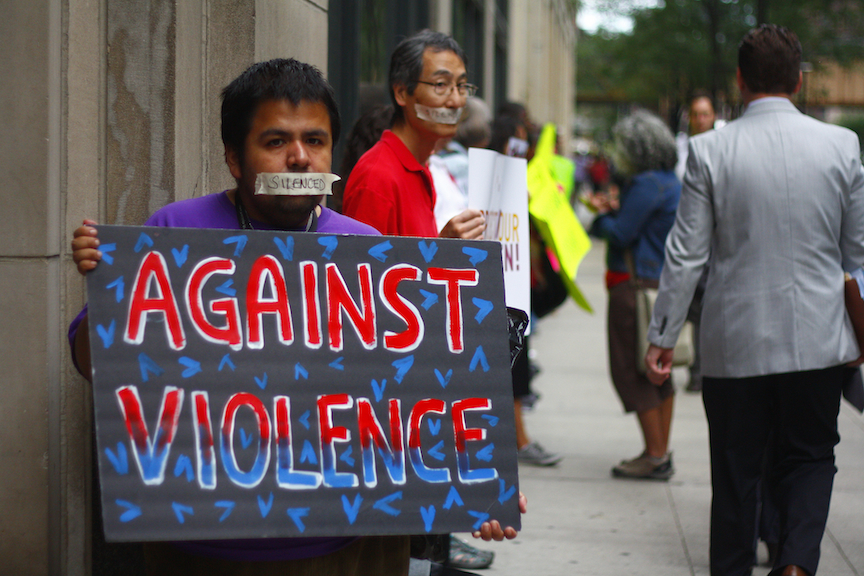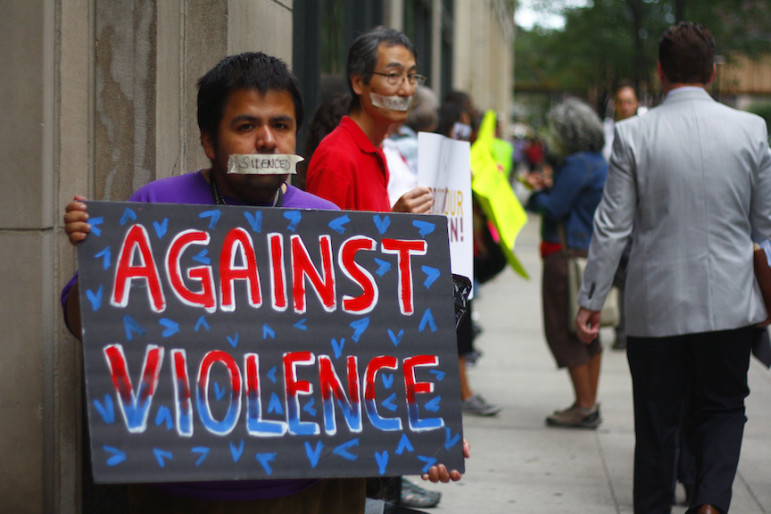
Susan Du / The Chicago Bureau
Protestors outside a panel discussion on youth prison rape.
From the Chicago Bureau:
Julie Biehl, director of the Children and Family Justice Center at Northwestern University, panned one glaring contributor to Illinois’ soaring rates of sexual abuse in youth prisons: the lack of advocacy on the part of incarcerated children.
“Although the public is not aware of this,” she said, “Illinois does not provide attorneys for incarcerated youth.”
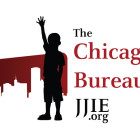 Without legal representation, young people “have no one to turn to whom they trust” in matters ranging from unwanted advances from prison staff to guidance in parole hearings that have the potential to determine the course of their lives, Biehl said at a hearing by the state’s Restorative Justice Committee this week at the James R. Thompson Center downtown.
Without legal representation, young people “have no one to turn to whom they trust” in matters ranging from unwanted advances from prison staff to guidance in parole hearings that have the potential to determine the course of their lives, Biehl said at a hearing by the state’s Restorative Justice Committee this week at the James R. Thompson Center downtown.
“Imagine for a moment you’re a teenager,” Biehl continued. “You’re incarcerated. You may be learning disabled; you may be traumatized; you probably don’t read at your grade level. Your release, your re-incarceration and your discharge from parole is at the discretion of the correctional officers. Maybe… you’ve been raped. There is no one to advocate exclusively for your rights, safeguarding your welfare and telling your story.”
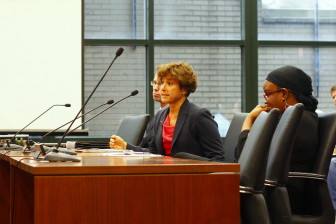
Susan Du / The Chicago Bureau
Julie Biehl speaks at a panel at the Restorative Justice Committee this week at the James R. Thompson Center in downtown Chicago, Il.
Democratic Rep. LaShawn Ford of Chicago convened the meeting of lawmakers, the state Department of Juvenile Justice and watchdogs to address the findings of the a prison rape study published last month by the federal Department of Justice.
The study, which examined nearly 9,000 anonymous surveys conducted at 336 facilities nationwide, highlighted Illinois as one of four states with the highest rates of reported sexual victimization.
Of the state’s 451 respondents, 15.4 percent claimed to have experienced sexual abuse — 6 percent more than the national average. IYC Joliet in particular reported that 21.1 percent of those surveyed had been victimized.
As a result of the study, the Illinois Juvenile Justice Commission, a state advisory group established to administer funding and study issues affecting youth prisons, offered recommendations to the DJJ to curb the “unacceptably high rates” of sexual violence in the state’s juvenile justice facilities.
Lisa Jacobs, IJJC vice chair, urged the DJJ to comply fully with the Prison Rape Elimination Act of 2003, maintain connections between incarcerated youth and their families, create meaningful grievance report processes and develop trauma care programs and other mental health services.
Yet above all, lawmakers agreed that the state stands little chance of denting its soaring rates of prison rape without forming an independent monitoring system, such as appointing an ombudsman or outfitting inmates with personal attorneys.
Mariame Kaba, founder of the restorative justice network Project NIA, spoke from her own experience as a rape survivor when she denounced the idea that young prisoners can report personal violations in a place where those in authority are the ones violating them as “hilarious in an awful way.”
“Rape is soul killing in ways you can’t imagine, that it takes years of healing to be able to stand and speak to that in a real way,” Kaba said during her testimony before the Restorative Justice Committee. “Young people need someone within the system they can honestly believe will actually do something about [their complaints].”
Assigning that personal advocate to inmates is indispensable, she argued, because youth wouldn’t feel safe reporting victimization any other way.
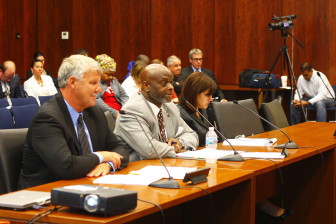
Susan Du / The Chicago Bureau
Arthur Bishop, the head of Illinois' juvenile justice system, listens to concerns over prison rape at the Restorative Justice Committee this week at the James R. Thompson Center in downtown Chicago, Il.
In what committee members lauded as a transparent display of collaboration with watchdog organizations on the issue of making prisons safer for youth, DJJ director Arthur Bishop responded to IJJC’s complaint and identified ways in which he has already tried to reduce sexual violence.
Flanked by his legal counsel, Bishop ensured the committee that DJJ has a zero-tolerance policy against sexual abuse, and that it has implemented PREA standards over the past year. An independent review team is currently assessing policies and procedures for reporting rapes and will publish the results of the investigation this fall, he said.
Bishop added that as of last month, DJJ has built in an automated 24/7 hotline for incarcerated youth to report sexual assault, drawing ire from Democratic Rep. Mary Flowers of Chicago, who questioned the reasoning behind depriving callers of immediate support by hotline operators.
Maintaining that the DJJ is doing more now than ever to decrease prison rape, Bishop called for communities of Illinois’ incarcerated children to realize that it’s not his job to parent.
“We need to look at families as a community-based resource, and that’s the model we’ve created in the department over the past six months,” he said. “[Youth] come to us scarred. We don’t want to become the de facto treatment. Sometimes youth come to us because the local community didn’t have any particular treatment programs so they thought, ‘Well, there’s always the Department of Juvenile Justice, so we’ll send him over there.’”
